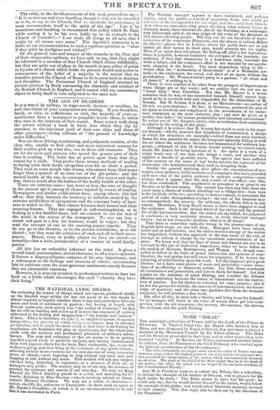THE AGE OF READERS.
Is you travel by railway, in stage-coach, steamer, or omnibus, be sure two-thirds of your companions are reading. If you breakfast, lunch, or dine, in coffeehouse or club, the majority of your co- masticators have a newspaper or pamphlet beside them, to which they turn in the intervals of their repast. Some cannot walk along the streets without a book in hand, into which they dip by snatches, to the imminent peril of their own shins and those of other passengers—living editions of "the pursuit of knowledge under difficulties."
Nor are these driving, masticating, and peripatetic readers, of the class who, unable to find other and more convenient seasons for their studies, pick up what they can at these odd moments. They are for the most part persons who spend the greater part of their time in reading. The habit has so grown upon them that they cannot lay it aside. They prefer these uneasy methods of reading to laying aside their books altogether even for so short a period. They read as some people take drams, who cannot keep their noses longer than a quarter of an hour out of the gin-palace : and the mental health of the one, in consequence of this excess and reple- tion, thrives much after the fashion of the bodily health of the other. These are extreme cases ; but, more or less, the tone of thought in the present age is among all classes injured by excess of reading. Newspapers and similar publications have, among others, this bad effect, that they increase the tendency to isolation created by the extreme subdivision of occupations and the constant hurry of busi- ness in which we live. Men vibrate between their homes and their counting-houses. They are engaged in self-contemplation, or in looking at a few familiar faces, and are content to see the rest of the world in the mirror of the newspaper. To run out into a crowd and gaze at a fire, fur instance, would be vulgar ; but they read the account of one in the morning papers eagerly. They do not go to the theatres, or to the picture-exhibitions, or to the church ; but they read the criticisms of each and all in their news- papers. Hence, even at public places we have no crowd—no assembly—but a mere juxtaposition of a number of small family- parties. All this has an unhealthy influence on the mind. It gives a second-hand, commonplace, unreal character, to all a man's opinions. It fosters a disproportionate estimate of his own importance, and a callousness to the feelings and interests of others ; accustoming him to cultivate even the more generous sentiments merely because they are pleasurable emotions.
However, it is scarcely prudent in professional writers to bear too bard on a foible which encourages the craft " whereby they have their living."


























 Previous page
Previous page